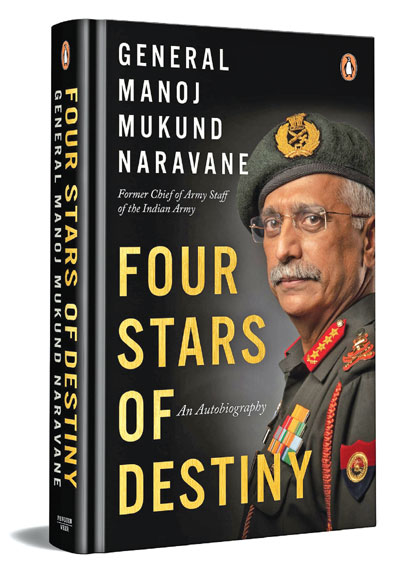Veterans engaging in political advocacy has its own perils
Shrikumar Sangiah
In December 2023, Penguin Random House released excerpts from the former Chief of Army Staff (COAS) Gen. M.M. Naravane’s memoirs Four Stars of Destiny. Publishers, while promoting books, commonly pick excerpts that are likely to start thoughtful discussions, reveal something unique about the book, spark a debate, or create a controversy. In the case of Gen. Naravane’s book, the publisher, clearly, was targeting the latter outcome.

deferred to until after the General Elections
In most vocations, controversies can end careers. Not so for actors and authors. Controversies and loud, vocal criticism help boost a film or a book’s visibility and, thereby, its viewership or sales. Penguin Random House, in choosing to publish the excerpts that it chose, was only following stock prescriptions from book promotions 101.
The publication of the excerpts, expectedly, not only precipitated heated contestations over what the former COAS had to say of his time as the COAS but also rekindled a wider debate on the appropriateness of military veterans publicly articulating partisan political positions.
Civil-Military Relations
There are many sources of friction in civil-military relations. None generates more controversy than political advocacy by military veterans. Officers and soldiers in active service are oath-bound to carry out the orders of the political executive—heedless of the party in power and their own political beliefs. In the case of personnel in active service, there can be no argument against the need for them to refrain from publicly voicing or taking any partisan political position.
However, with military veterans, the issue becomes tangled. It could be argued that military veterans are private citizens and hence have the right, just like other citizens, to engage in political activity. Another view holds that although veterans have the right to articulate their political positions, they have a greater duty to the military that they served in to refrain from doing so. Those holding this view feel that when veterans engage in political advocacy, it erodes the apolitical standing of the military in the eyes of the political executive and the citizenry—diluting the political executive’s trust in the non-partisan character of officers and soldiers in active service.
Yet another view holds that requiring veterans to muzzle their voices diminishes the quality of public discourse and deprives the nation of a source of potentially valuable insights on issues of national interest. Those holding this view argue that veterans, in fact, are duty-bound to speak out on issues of public and national interest. They argue that the active participation of veterans in public discourse is in the best interests of the country that they served while in uniform.
A Contrarian View
Writing in the Times of India in 2017, the former Chief of Naval Staff Admiral Sushil Kumar opined that, ‘high-ranking military veterans dabbling in politics, after they have had a distinguished career in the Indian armed forces, raises serious issues. Despite noble intentions, they are bound to get sucked into a political minefield, where the principles they upheld for decades could be blown to smithereens.”
Continuing in the same vein, the late admiral added that, “for military personnel in active duty at the time this creates a dilemma, since the principles in which they are rigidly grounded no longer seem sacrosanct.”
The debate around military veterans and their political advocacy is not restricted to India alone. Concerns identical to those that Admiral Sushil Kumar raised in his article, were also raised in the United States (US) when in 1988 General P.X. Kelley endorsed George H.W. Bush’s candidacy or when in 1992 presidential candidate Bill Clinton was endorsed by General W.J. Crowe. Then in 2006, there was the much-in-the-news “revolt of the generals” when six recently retired generals criticised Donald Rumsfeld, the secretary of defence, for his poor management of the Iraq war. More recently, in 2016, candidate Trump had 88 senior retired military officers endorsing his candidacy. In a tit-for-tat move, candidate Hillary Clinton then released a list of 95 generals and admirals who were endorsing her candidacy.
Heated debates around the appropriateness of partisan political advocacy by veterans were once again sparked off in the US during the May 2020 protests following the killing of George Floyd by a white police officer. The protests turned violent and there was widespread destruction of property and looting. To quell the disturbance, President Trump, reportedly, considered deploying up to 10,000 regular troops. In response, many senior retired veterans spoke out in protest and said that such an action would be unconstitutional.
The veterans said that not only would such an action be violative of the norm of not using the military for law enforcement, but that it would also signal a general decline in the country’s democratic traditions. Many of the veterans also contended that the use of the military to quell protests impinged on people’s fundamental right to peaceful assembly. The greatest fear, the generals and admirals said, was that if the Trump administration were to use the military against its citizens, it would polarise the military and jeopardise the continuance of its apolitical character. In this instance, eventually, the military was not used.
You must be logged in to view this content.

